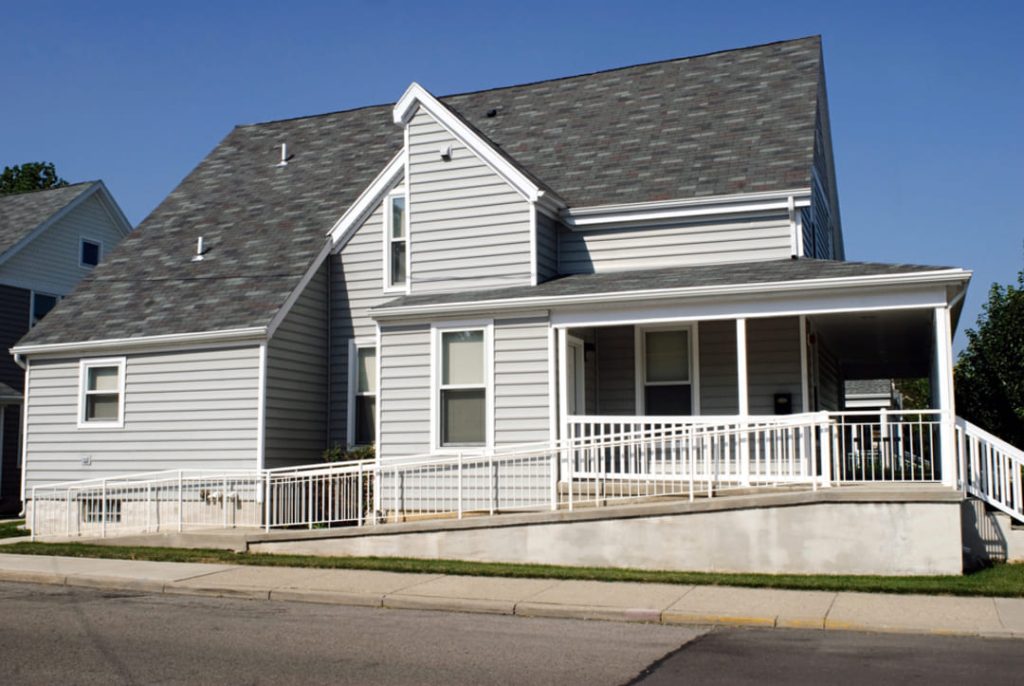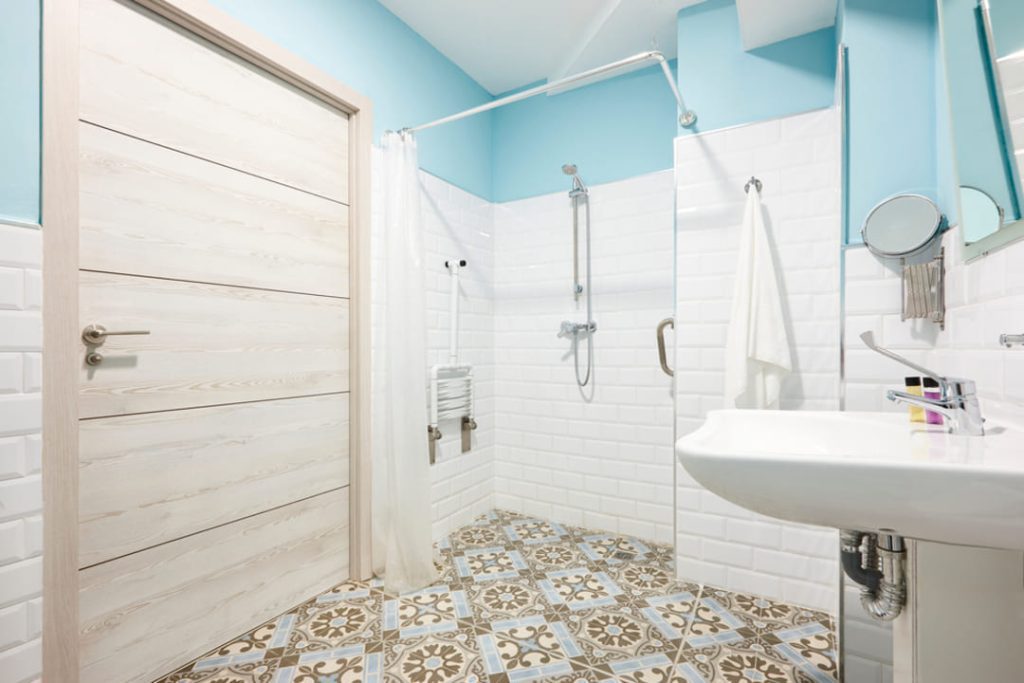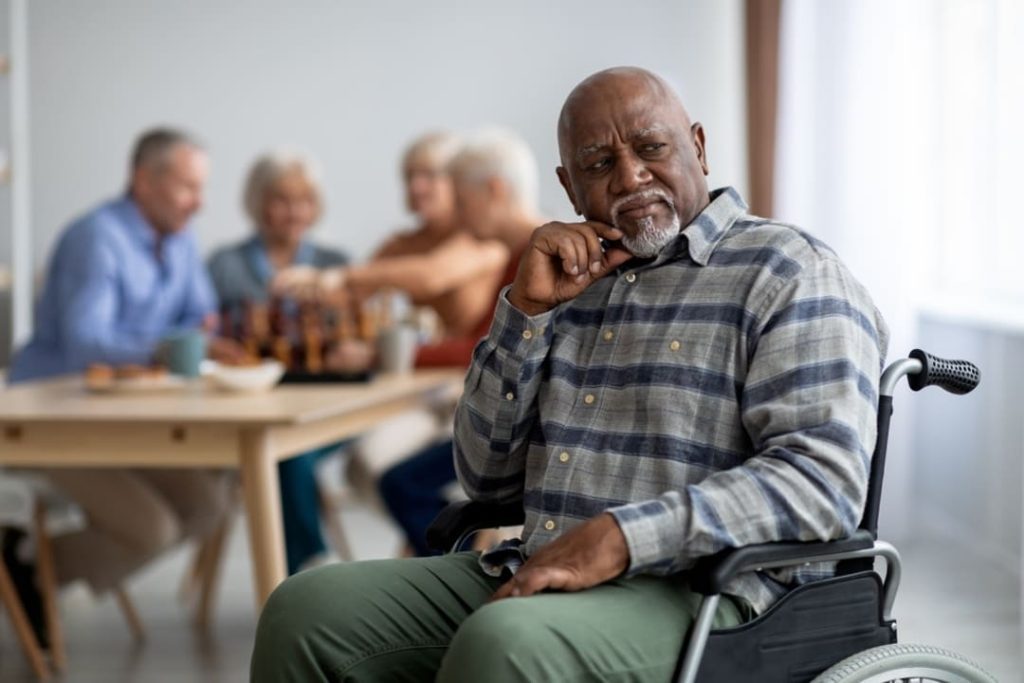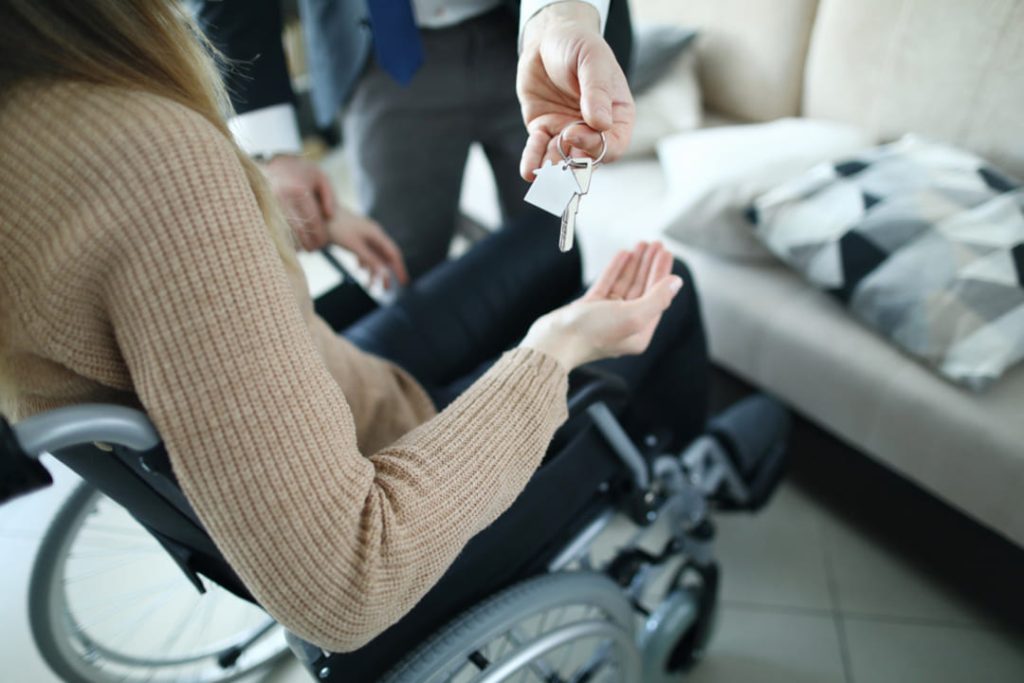Looking for Expert-Level VA Claim Answers?📱Call Us Now! 737-295-2226
Service-related injuries and illnesses can change many of your day-to-day needs, including those within your living space.
Fortunately, there is help if you’re looking to buy, build, or modify a home to accommodate your disability.
In this post, we’ll explore the Specially Adapted Housing Grant. We’ll also look at other available VA housing grants for disabled veterans, including housing grants for veterans with PTSD.
Read on to learn more!
Table of Contents

100% Disabled Veteran Housing Allowance
There are 3 main types of adaptive housing grants available through the VA for a home you plan to live in long-term.
These grants are often associated with a 100% disability rating. However, having a 100% disability rating is not required to qualify for any of these 3 grants.
What is required is that you have a certain type of disability that affects your ability to access your home. These types of disabilities are often awarded 100% ratings.
These VA housing grants can help cover the cost of making your home more accommodating to your disability:
- Special Home Adaptation Grant (SHA)
- Specially Adapted Housing Grant (SAH)
- Home Improvement and Structural Alterations Grant (HISA)
Special Home Adaptation Grant (SHA)
What does it cover?
Adaptations to a home that you own, are buying, or are building.
What are the eligibility requirements?
- You (or a family member) own or will own the home
- You intend to live in the home long-term
- You have a qualifying service-connected disability to include:
- The loss or loss of use of both hands
- Certain severe burns
- Certain respiratory or breathing injuries
How much does it cover?
Up to $22,036 (for fiscal year 2023)
Do I have to use it all at once?
No.
If you don’t use all of the money from your grant this year, you can use it in installments in future years up to six different times.

Specially Adapted Housing Grant (SAH)
The SAH is very similar in its name to the SHA grant mentioned above.
However, the SAH is a bigger benefit with different eligibility requirements.
What does it cover?
Adaptations to a home that you own, are buying, or are building.
What are the eligibility requirements?
- You own or will own the home
- You intend to live in the home long-term
- You have a qualifying service-connected disability to include:
- The loss or loss of use of more than one limb*
- The loss or loss of use of a lower leg, along with the lasting effects of an organic (naturally occurring) disease or injury
- Blindness in both eyes (with 20/200 visual acuity or less)
- Certain severe burns
- The loss, or loss of use, of one lower extremity (foot or leg) after September 11, 2001, which makes it so you can’t balance or walk without the help of braces, crutches, canes, or a wheelchair
IMPORTANT NOTE: Effective after September 11, 2001, only 120 veterans and service members can qualify for a grant based on the loss of one extremity each fiscal year (October 1 through September 30).
If you qualify for this grant but don’t receive it in a given year, don’t give up. You may be able to receive it in a future year.
How much does it cover?
Up to $109,986 (for fiscal year 2023)
Do I have to use it all at once?
No.
As with the SHA, if you don’t use all of the money from your grant this year, you can use it in installments in future years up to six different times.
Home Improvement and Structural Alterations Grant (HISA)
Unlike the SHA and SAH, the HISA grant is not just available to veterans with a service-connected disability.
There are two tiers of benefits:
- The lower of the two is for veterans with disabilities unrelated to their military service.
- The higher is for service-connected disabilities.
What does it cover?
Making medically necessary improvements and structural alterations to a veteran’s or service member’s primary residence for the following reasons:
- Allowing entrance to or exit from the primary residence
- Use of essential bathroom facilities (e.g., wheelchair-accessible showers)
- Allowing accessibility to kitchen or bathroom sinks or counters (e.g., lowering counters/sinks to wheelchair-friendly heights)
- Improving entrance paths or driveways in the immediate area of the home to allow for the addition of permanent ramping
- Improving plumbing or electrical systems to accommodate home medical equipment
HISA does not cover:
- Walkways to separate exterior buildings
- Spa, hot tub, or Jacuzzi
- Security systems
- Exterior decking
- Removable equipment or appliances such as portable ramps, porch lifts, stair glides
- Routine home maintenance (like roof repairs or replacements, HVAC repairs or replacements, etc.)
- New Construction
What are the eligibility requirements?
For the higher benefit ($6,800), you must:
- Have a service-connected disability that will be addressed by the proposed alterations
- Have a compensable disability treated “as if” it is a service-connected disability. The Veteran must be entitled to medical services for this disability under 38 USC 1710(a)(2)(c) (e.g., disability acquired through treatment or vocational rehabilitation provided by VA)
- Have a non-service-connected disability alongside a service-connected disability with a VA rating of 50% or greater (disability percentages may not be combined)
For the lower benefit ($2,000), you must:
- Have a disability that is not covered in the above requirements

You DESERVE a HIGHER VA rating.
Take advantage of a VA Claim Discovery Call with an experienced Team Member. Learn what you’ve been missing so you can FINALLY get the disability rating and compensation you’ve earned for your service.
Housing Grants for Veterans with PTSD
The VA offers adaptive housing grants for veterans with PTSD.
However, you don’t qualify for the VA’s disability housing grants based solely on having PTSD.
You must also meet the other eligibility requirements listed above.
If awarded the grant, you can adapt your home to fit your PTSD-related needs. Some veterans have installed sound-absorbing wall paneling or soft flooring to minimize triggering noises.
Another example of an adaptation is adding HVAC units instead of ceiling fans, as the rapid movement of fans can trigger flashbacks.
VA Home Adaptation Grants for Temporary Residence
The grants covered above are only for permanent residences. But what if you’re not living in your forever home?
For these situations, the VA offers a temporary adaptation grant.
Temporary Residence Adaptation Grant (TRA)
What does it cover?
Adapting the home of a family member that you are living in temporarily.
What are the eligibility requirements?
- You qualify for a SHA or SAH grant (with the exception of the requirement to live in a home that you own and plan to live in long-term)
- You are temporarily living in the home of a family member that needs to be changed to meet your needs.
How much does it cover?
- Up to $7,910 for fiscal year 2023 if you qualify for an SHA grant.
- Up to $44,299 for fiscal year 2023 if you qualify for an SAH grant.

Can I Qualify for a VA Adaptive Housing Grant if I Have Less Than a 100% VA Disability Rating?
Yes.
These adaptive housing grants are for veterans and service members with certain service-connected disabilities.
While there are specific requirements for these adaptive housing grants, a 100% disability rating is not a prerequisite.
What if I Have not Been Granted a 100% VA Disability Rating but Believe I am Underrated?
Then you are in very good company! Many veterans are underrated for their service-connected illnesses and injuries. Contact us for information about applying for a VA disability increase.
We can provide you with the full spectrum of education and resources you will need to appeal your rating.
We’ll also connect you with a supportive community of thousands of veterans to help you as you seek the rating you are legally entitled to.
How do I Apply for a VA Adaptive Housing Grant?
You can start the application process on the VA’s website.
Is There Help for Affording a Home in the First Place?
Yes.
Before you can even consider modifications to your home, you need to have a home.
Here are a few good resources for affording adequate housing:
Help for Homelessness
If you’re facing homelessness, there are a number of government programs, including:
HUD-VASH (U.S. Department of Housing and Urban Development-VA Supportive Housing)
A program run by both HUD and VA, this program combines HUD’s housing vouchers with the VA’s support services, helping tens of thousands of families qualify for homes.
HUD provides rental assistance so that veterans can rent privately owned homes, and the VA steps in with services like health care, mental health treatment, and substance abuse counseling as needed.
GPD (Homeless Providers Grant and Per Diem Program)
This program provides grant money to state, local and tribal governments, who use that money to provide transitional housing for homeless veterans.
This is a huge nationwide effort, with more than 600 agencies providing more than 14,500 beds for veterans.
A VA liaison oversees the program and ensures veterans receive appropriate services (including employment counseling and social services) on their way to home stability.
National Call Center for Homeless Veterans: (877) 424-3838
If you’re at risk of becoming homeless, this center can connect you with assistance and resources to help get you into suitable housing.
VA Home Loan Programs
VA loans are provided by private lenders (banks, mortgage companies, etc.), but the VA guarantees a portion of the loan, which allows the lender to give you more favorable terms.
Perks of a VA home loan include:
- No down payment required
- Low interest rates
- Reduced closing costs
- No private mortgage insurance (PMI) needed
- Lifetime benefit (can be used multiple times)

Wrapping Up
We want to make sure you get every penny you’re due by law. You’ve served your country, and you need and deserve the support these grants aim to provide. If you need VA housing assistance but don’t have a service-connected disability, take the next step today in your VA claims journey and file a claim.
It could make a significant difference in your life.
If you’re looking to increase your rating or are filing for the first time, reach out and schedule your FREE VA Claims Insider Discovery Call.
This is a short but powerful call that could make all the difference in winning your VA claim!
Also, be sure to check out our FREE Resources page and our Blog for all your VA claims questions!




